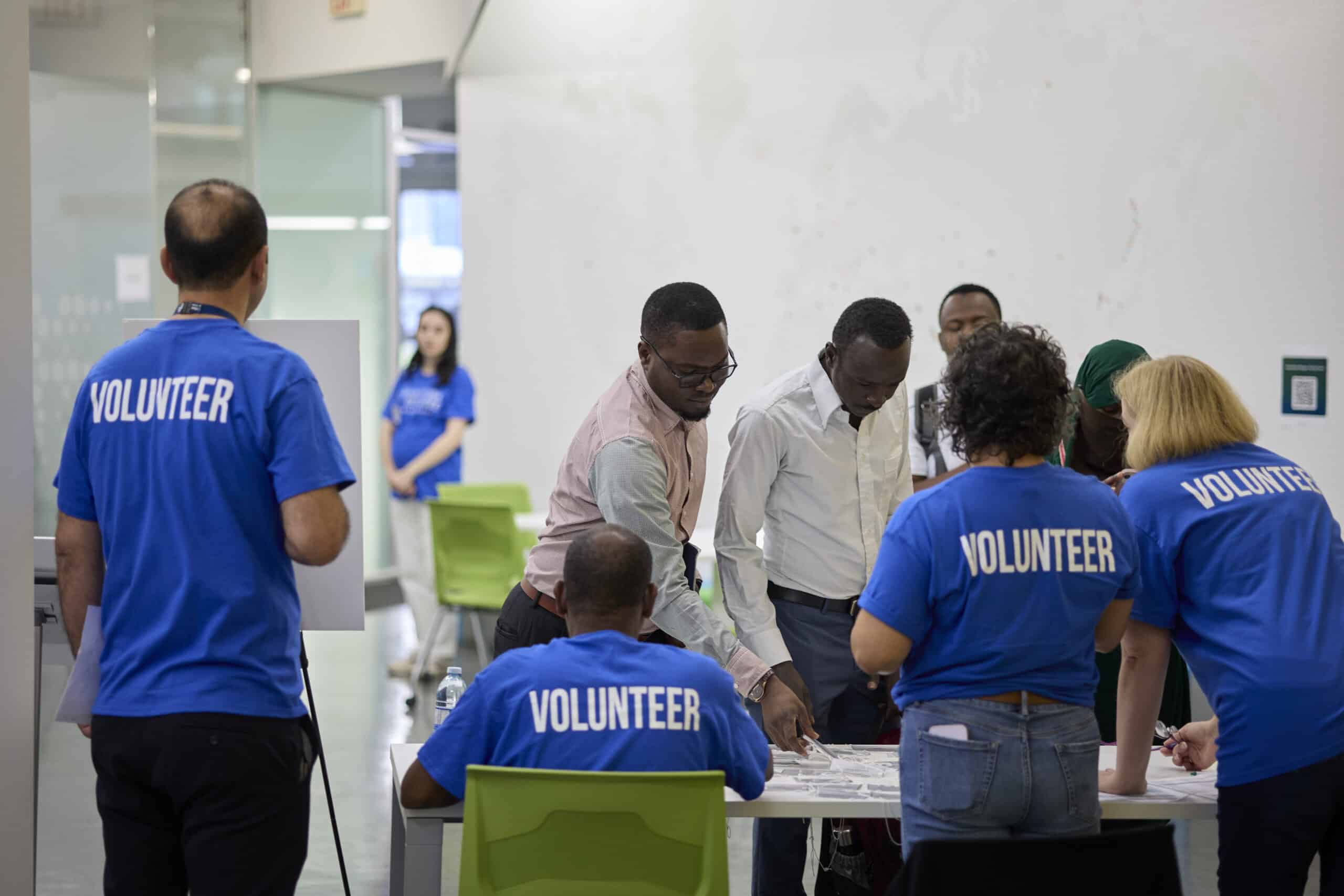Ask Me Anything: Understanding Employer Expectations & Navigating HR in Canada
On August 6, 2025, Jumpstart Refugee Talent hosted an informative “Ask Me Anything (AMA)” virtual session titled “Understanding Employer Expectations & Navigating HR in Canada.” This webinar was designed to support newcomer refugees who are interested in human resources (HR) landscape or navigating the Canadian job market. The webinar featured two experienced HR professionals from the Human Resources Professionals Association (HRPA), sharing insights and real-life stories.
The webinar began with a warm welcome and was structured around four essential questions that many newcomer refugees care about:
- How can newcomers engage with HRPA, become members, and access career resources?
- What are the common hiring mistakes made by newcomer job seekers?
- What do employers truly value beyond technical skills?
- What role does inclusive hiring play from HR perspective?
The session concluded with a live Q&A, giving attendees the chance to ask questions directly and receive tailored advice.
Meeting Our Guest Speakers
The session was led by two outstanding guest speakers from the HRPA: Diane Biesinger, Senior Manager of Human Experience, and Katarina Robertson, People Operations Manager. Diane is a seasoned HR leader known for her people-first approach and deep commitment to inclusion, diversity, equity, and accessibility. She shared valuable insights on employee experience, inclusive hiring, and how HRPA supports newcomers through learning and membership opportunities. Katarina, who oversees all facets of internal HR operations, brought practical knowledge around recruitment, selection, and workplace systems. Together, they offered a well-rounded perspective on how newcomer refugees can succeed in Canadian career path.

Katarina Robertson, People Operations Manager at HRPA
Resources and Learning Opportunity from HRPA
HRPA offers several flexible membership streams to help you get started and there is no Canadian experience required. Katarina explained that HRPA offers several membership types, each with its different annual dues. Starting with the Practitioner Class which is the standard entry point and is open to anyone interested in HR. It is no prior education or CHRP designation is required. The Student Class is for full-time HR students not working full-time, costing as little as $50 per year. There is also an Allied Professional class for individuals in other regulated professions.
For newcomer refugees who have received permanent residency (PR) or an open work permit within the last two years, HRPA offers an Internationally Educated Professional (IEP) membership. This path requires no transcripts or Canadian experience, just proof of immigration status, and can be completed fully online.
Beyond that, newcomer refugees gain access to a variety of learning and networking opportunities as members. From webinars, certificate programs, and conferences, to more flexible on-demand tools. Members can also connect with others through mentorship programs, discussion forums, and job-specific communities. HRPA’s exclusive job board, open only to members, features HR roles across Ontario and is a practical tool many have used to secure employment, including Katarina herself.
If you are still considering membership, HRPA also offers a free HR Insights newsletter, packed with HR trends and best practices, offering a welcoming and practical starting point for your HR and job seeking journey in Canada.
Tips for Avoiding the Common Mistakes in Job-search Process
- Resume:
A common mistake is using a one-size-fits-all resume for multiple applications. Instead, customizing the resume for each role, tailoring it to reflect the specific skills and experiences that match the job description is important. Use bullet points to highlight results-driven achievements and ensure your professional experience and education are listed in a logical order.
- Cover Letter:
Many candidates either skip the cover letter or treat it as an afterthought. Katarina strongly encouraged newcomers to take the time to write a short, thoughtful letter that goes beyond the resume, explaining your transferable skills, relevant experience, and interest in the role.
- Interview:
Prepare questions to ask at the end of the interview is necessary, such as questions about the team, workplace culture, or onboarding process. This shows genuine interest and helps you assess whether the organization is right for you.
- Follow-Up Etiquette:
Katarina advised sending a follow-up message in two to three days after the interview. A polite email or phone call expressing continued interest and offering to provide additional information. If you do not hear back after two follow-ups, it’s best to move on and keep applying elsewhere rather than focusing too heavily on one opportunity.
- Networking & Community Resources:
Do not rely solely on online job boards. Many HR professionals find candidates through referrals, job fairs, and local community organizations. Katarina shared that their team received almost 100 resumes in a job fair that they did not even have to post on the job board to find the candidate.
Beyond Technical Skills
Soft skills and personal qualities are also important and valued by employers. These include abilities like clear communication, teamwork, adaptability, problem-solving and the capacity to work well with others. Employers value these qualities because they directly impact how effectively someone can collaborate and help the organization succeed in the long term.
Strong communication skills — it is not about having a “perfect” accent, but about expressing ideas clearly, respectfully, and in a well-structured way.
Teamwork and collaboration skills — the ability to work well with others, share ideas, and contribute to group problem-solving is increasingly important. Diane highlighted adaptability and problem-solving as key traits, especially in fast-changing environments.
Initiative — taking action without always being prompted. Diane shared an example of a newcomer student who impressed her by going beyond. These extra steps signaled motivation and a genuine commitment to contributing value.
Finally, Diane pointed out that for newcomer refugees without Canadian experience, they should consider framing international work experience as a strength, showing how it prepared them to work in diverse environments. Employers notice when a candidate demonstrates curiosity, care for their work, and a willingness to continuously learn—qualities that often matter as much as what is listed on a resume.
Inclusive Hiring
Inclusive hiring, from an HR perspective, means removing those biases and focusing on skills, potential, and cultural contribution rather than defaulting to “Canadian experience” as a shortcut to trust.
While overcoming these barriers is ultimately an employer’s responsibility, job seekers can take steps to build trust and showcase their value. Diane encouraged candidates to prepare examples that demonstrate their skills, and to use storytelling methods like STAR (situation
task, action, result) to make these qualities stand out.
Diane also advised researching organizations beforehand to ensure they truly embrace inclusion and to know your rights regarding questions about immigration or refugee status. If you are asked such questions inappropriately, candidates can redirect the conversation to their skills and strengths, keeping the focus on what they bring to the role.
Final Thoughts
The session wrapped up with a lively Q&A, where participants from diverse backgrounds and experiences asked questions tailored to their own journeys. Our guest speakers responded with honesty and practical advice, making everyone feel seen, heard, and supported.
While challenges and barriers are part of the journey for many refugee newcomers, having the right resources, connections, and guidance can make all the difference.
At Jumpstart, we are here to help! Whether you are exploring career options, building your professional network, or planning your next step in Canada, book a free one-on-one meetings at Jumpstart can help you find unique solution in your specific field.
Key Takeaways
- Join HRPA membership to access affordable career resources and networking.to access affordable career resources and networking.
- Customize resumes and cover letters to highlight transferable skills.
- Build connections through events, mentorship, and community resources.
- In interviews, use the STAR method and show communication, adaptability, and initiative.
- Focus on your strengths and seek inclusive employers.
- Jumpstart is here to support you every step of the way with job opportunities.







